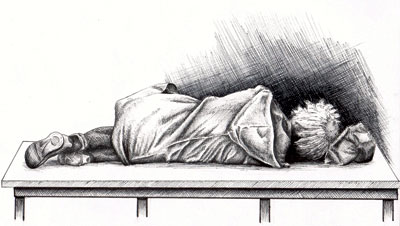All Nonfiction
- Bullying
- Books
- Academic
- Author Interviews
- Celebrity interviews
- College Articles
- College Essays
- Educator of the Year
- Heroes
- Interviews
- Memoir
- Personal Experience
- Sports
- Travel & Culture
All Opinions
- Bullying
- Current Events / Politics
- Discrimination
- Drugs / Alcohol / Smoking
- Entertainment / Celebrities
- Environment
- Love / Relationships
- Movies / Music / TV
- Pop Culture / Trends
- School / College
- Social Issues / Civics
- Spirituality / Religion
- Sports / Hobbies
All Hot Topics
- Bullying
- Community Service
- Environment
- Health
- Letters to the Editor
- Pride & Prejudice
- What Matters
- Back
Summer Guide
- Program Links
- Program Reviews
- Back
College Guide
- College Links
- College Reviews
- College Essays
- College Articles
- Back
Teens are Chronically Stressed and Sleep Deprived
Wake up at 6 AM. Drive to school. Spend 8 hours in tough classes. Go to after-school activities for 3 hours. Come home. Shower, eat, spend time with your family. Do homework and study. Get some sleep. Repeat.
The daily routine of the conventional high school student consists of a jam-packed schedule that can be highly stressful and take up time that should be spent sleeping. According to the Journal of Adolescent Health, a mere 8% of American teenagers get the recommended 9 to 9.5 hours of sleep per night, while the American Psychological Association reports that teens believe their stress levels during the school year surpass a healthy level. Due to the sky-high demands of today’s society, teenagers are becoming chronically stressed and sleep-deprived, impacting their health and well-being.
A study performed by Barnard College Professor Russell D. Romeo and published by the National Institute of Health outlines the body’s physiological response to stress and how it affects health. Two main hormonal systems of the body are activated during stressful situations: the sympathetic nervous system and the hypothalamic-pituitary-adrenal (HPA) axis.
The sympathetic nervous system is the division of the nervous system that is actuated when the brain perceives a threat. The activation of the sympathetic nervous system involves the release of the hormones epinephrine and norepinephrine into the bloodstream, which stimulates the “fight or flight” response to stress.
The HPA axis is the body’s central stress response system. Its activation involves neurons in the hypothalamus, the region of the brain that controls self-regulatory systems such as body temperature and hunger. These neurons secrete a corticotropin-releasing hormone, which signals the release of the hormone adrenocorticotropin, which stimulates the secretion of cortisol. Cortisol, the primary stress hormone, is responsible for many bodily reactions to stressors. Prolonged exposure to cortisol can lead to physical and psychological symptoms, including heartburn, tension headaches, insomnia, high blood sugar, heart rate, blood pressure levels, stomach problems, anxiety, irritability, anger, depression, and thoughts of suicide.
While sleeping, the heart and blood vessels are repaired, chemicals that fortify the immune system begin to circulate, and the hormones such as those that aid in growth and appetite control are released. Getting an adequate amount of sleep reduces stress, strengthens the immune system, improves mood and thinking, helps avoid injuries, helps to maintain a healthy weight, and lowers the risk of developing serious health issues. When teens suffer from a lack of sleep, they not only miss out on the benefits of sleep but also experience assorted negative consequences, including impaired memory, decreased quality of life, relationship stress, high blood pressure, diabetes, obesity, heart attack, anxiety, stroke, and depression.
In short, an increase in the stress hormone cortisol is linked to a lack of sleep. This results in an endless cycle, in which stress leads to poor sleep resulting in additional stress. Realizing the relationship between sleep and stress is crucial to understanding how the at times “unrealistic” expectations of society are affecting the lives of teens.
Our society places an ever-growing emphasis on going to college to land a decent job. Throughout the past few decades, it has become increasingly difficult to both get accepted into a good college and to pay for a college education. These factors are placing an immense deal of stress on teenagers to participate in an abundance of extracurricular activities, prep for and do well on standardized tests, and maintain decent grades in order to gain admittance into schools and receive scholarships. All of these seeming responsibilities, especially when coupled with the responsibilities of family life, social life, and economic status are affecting the amount of stress students experience and therefore the quality of their sleep.
Adolescent sleep needs to be discussed and valued as much as eating and exercise habits. Once we begin to turn our attention towards the interdependence of sleep and stress, we will start to understand how society’s current expectations of teens are unsustainable.
----------------------------------------------------------------------------------------------------------References
Anthony, Portantino J. School Start Time Research & Information.
“American Psychological Association Survey Shows Teen Stress Rivals That of Adults.” American Psychological Association, American Psychological Association, 2014.
Romeo, Russell D. “The Teenage Brain: The Stress Response and the Adolescent Brain.” Current Directions in Psychological Science, U.S. National Library of Medicine, Apr. 2013.
“The Effects of Stress on Your Body.” Healthline, Healthline Media.
Aramli, Mark. “5 Stages of Sleep: Your Sleep Cycle Explained.” BedJet, 2017.
“Get Enough Sleep.” Healthfinder.
Team, Spine. “What Happens to Your Body When You Don't Get Enough Sleep.” Health Essentials from Cleveland Clinic, Health Essentials from Cleveland Clinic, 18 Dec. 2018.

Similar Articles
JOIN THE DISCUSSION
This article has 0 comments.
